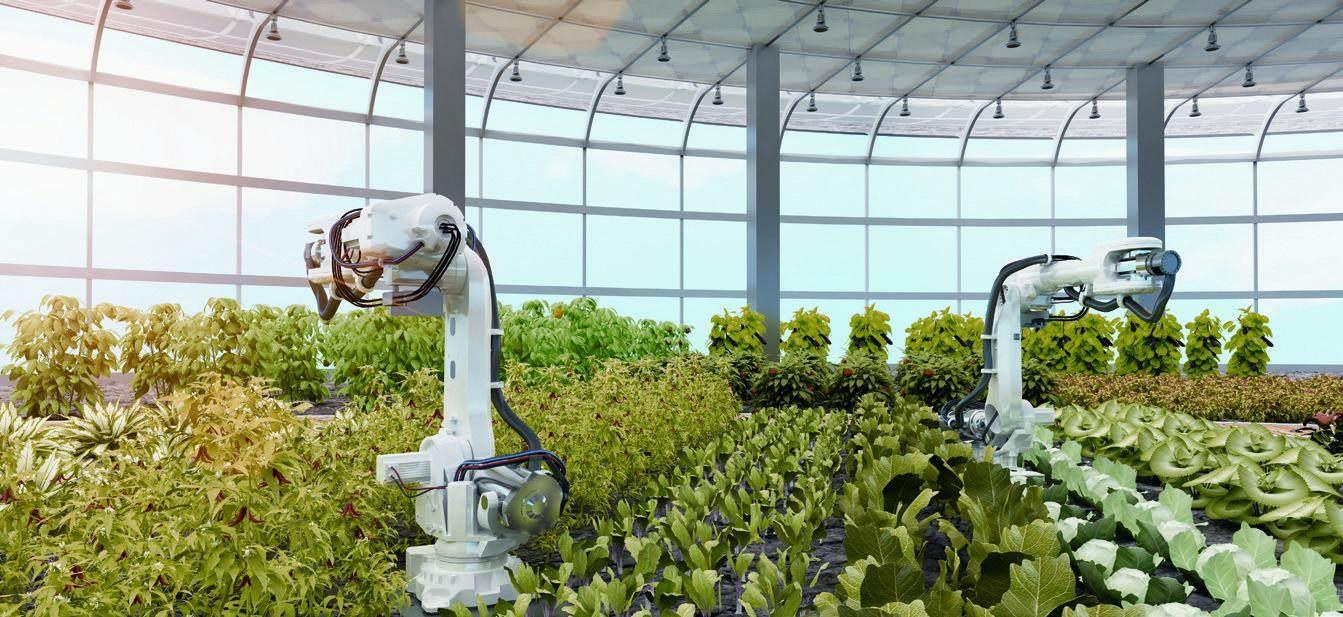The Bio-economy Ushers in Great Development
By Lily Wang
On May 10, the National Development and Reform Commission released the 14th Five-Year Plan of the Bioeconomy Development, which is the first of its kind in history.
What is a bio-economy? What industries will become the pillar industries of the bio-economy?
Improve the ability to deal with major infectious diseases
The bioeconomy is an economic form driven by the development and progress of life science and biotechnology, based on the protection, development and utilization of biological resources, and characterized by extensive integration of medicine, health, agriculture, forestry, energy, environmental protection and other industries.
Xu Tao, academician of the Chinese Academy of Sciences, said that the 14th Five-Year Plan period is a key period for the development of Chinas bioeconomy. There are still some issues in the development of Chinas bioeconomy, such as weak original innovation ability and lack of key technologies. The reasons include that Chinas sustained investment in the field of bioeconomy is insufficient, the innovation forces are scattered, and there are no leading research institutions or enterprises with the leading effect.
Wang Xiang, Deputy Director of the High Technology Department of the National Development and Reform Commission, introduced at the press conference that looking forward to 2035, Chinas comprehensive bioeconomy strength will lead the world, and a new development situation with leading technology, strong industrial strength, wide integration and application, strong resource guarantee, controllable security risks and improved system will take shape.
The plan proposes that we should promote the development of the medical health industry, make early prevention of diseases, accelerate the upgrading of vaccine R&D and production technology, develop multi-linked and multivalent vaccines, new genetic engineering vaccines and therapeutic vaccines, and improve the response ability to major infectious diseases.
In addition, we should promote the deep integration of advanced technologies such as genetic testing and biogenetics with disease prevention, carry out early screening of major diseases such as genetic diseases, birth defects, tumors, cardiovascular diseases and metabolic diseases, and provide precise solutions and decision-making support for individualized treatment. At the same time, we shall improve disease diagnosis ability and clinical treatment ability.
Develop artificial protein and other new foods
The plan proposes to develop biological breeding technologies such as genomic selection, systems biology, synthetic biology and artificial intelligence, develop synthetic biology technology, and explore new foods such as artificial protein. It also suggests improving the production capacity and quality of grain and other key agricultural products.
The plan requires that on the premise of respecting science, making strict supervision, complying with law and regulation and ensuring safety, we should orderly promote the industrial application of biological breeding, and ensure the supply of grain, meat, eggs, milk, oil and other key agricultural products. We shall develop genomic selection, systems biology, synthetic biology, artificial intelligence and other biological breeding technologies in an orderly manner, to improve the ability of breeding, production and processing, popularization and application of improved seeds, and accelerate the construction of a commercial breeding innovation system.
The plan also proposes to promote the development of bioenergy and bioenvironmental protection industries, actively tap bio-energy, orderly develop biomass power generation and promote the upgrading to co-generation. It shall also carry out R&D of new biomass energy technologies, promote the integrated development of biofuels and biochemical industry, and establish standards for biomass combustion and mixing.
The plan specifies that it is imperative to use functional microorganisms, enzymes and other biotechnologies to promote water nitrogen and phosphorus removal, soil remediation from heavy metal pollution and solid waste utilization and disposal. It shall also further improve the comprehensive utilization level of straw, develop biological environmental protection industrial chains such as bio-environmental response monitoring for pollutants, bio-degradation and remediation, and biological resource recycling, to win the battle of preventing and controlling pollution of air, water and soil.
In addition, the plan also proposes to optimize and improve medium and high temperature anaerobic fermentation bacteria, improve the biomass anaerobic treatment process, produce better complete anaerobic fermentation equipment, and speed up the research of key technologies such as biological natural gas, cellulosic ethanol and algae biofuels and the manufacturing of related equipment. It shall actively promote the alternative application of advanced biofuels in key areas such as municipal administration and transportation, and make fossil energy green, low-carbon and renewable.
Bioeconomy covers multiple industries
Wang Xiang said that the bioeconomy covers a wide range of industries. The plan proposes to cultivate the pillar industries of bio-economy from the following four aspects.
The first is to accelerate the development of biotechnology to empower the health industry. It mainly includes three promotions: promote the deep integration of advanced technologies such as gene testing and biological genetics with disease prevention; promote the innovated integration of biotechnology with cutting-edge technologies such as precision machinery, new materials and additive manufacturing; promote the integration of advanced technologies such as genome editing, microfluidic chip and cell preparation automation with biological drug research and development.
The second is to accelerate the development of biological breeding technology to empower biological agricultural industry. We shall orderly develop genome-wide selection, systems biology, artificial intelligence and other biological breeding technologies to improve the production capacity and quality of grain and other important agricultural products; we shall also develop the green agriculture, promote the integration of cutting-edge biotechnology in the agricultural field, and improve Chinas agricultural production efficiency.
The third is to accelerate bio manufacturing technology to empower bioenergy and bio-environmental protection industries. We shall develop high-performance bio environmental protection materials, biological agents, functional microorganisms and enzyme agents to promote environmental protection and pollution control; we shall carry out research, development and cultivation of new biomass energy technologies and promote the transformation of fossil energy into green, low-carbon and renewable energy.
The fourth is to accelerate the development of information technology to empower the biological information industry. We shall rely on artificial intelligence technology, biomedical and health big data resources to assist personalized new drug research and development; we shall use 5g, blockchain, IoT and other cuttingedge technologies to realize the whole life cycle management of drugs and vaccines from production to use; we shall deepen the application of health big data in medical research, education and training, clinical diagnosis and treatment, product research and development, industry governance, medical insurance payment and other aspects.
Also, the plan proposes seven major projects: the improvement of innovation ability, the benefit of biomedical technology to the people, the improvement of modern seed industry, the demonstration of bioenergy and environmental protection industry, the integrated application of biotechnology and information technology, the preservation and development of biological resources, and the construction of bioeconomy pilot area.
Zhou Jian, Deputy Director of the Consumer Goods Industry Department of the Ministry of Industry and Information Technology, said at the press conference that the biomedical industry is an important part of the bio-economy. We shall implement the project of cultivating pharmaceutical pilot enterprises, and support the innovation and upgrading of large enterprises through generic drug consistency evaluation and volume-based procurement. The purpose is to raise market competitiveness and sustainability and form a batch of large-scale enterprises with high degree of internationalization and global layout. We shall also cultivate new forces of industry development, and support the growth of specialized, fined, peculiar, innovative “little giant”enterprises that focus on specialized sectors and with strong professionalism and innovation ability.
Recently the governments of many places have issued relevant documents to actively promote the development of bioeconomy. For example, on March 30, Heilongjiang Province issued the 14th Five-Year Plan for the Development of the bioeconomy in Heilongjiang Province and the “Several Policies and Measures to Support the High-quality Development of bioeconomy of Heilongjiang Province”. By 2025, the total scale of bioeconomy in Heilongjiang Province is expected to exceed RMB 420 billion, with the proportion of added value in regional GDP up to 10%.
Sichuan Province and Hubei Province have raised the RMB 1.5 trillion and RMB 650 billion for the targets of bioeconomy scale by 2025 in their 14th Five-Year Plan respectively; Nanjing also mentions in the “Threeyear Plan for Bioeconomy Development(2021-2023)” that by 2023 the bioeconomy will become a new growth point for the city economy, with the total industrial scale of about RMB 400 billion.
Xu Tao said that life and health is one of the key fields that are most expected to see the revolutionary breakthroughs in the new round of scientific and technological revolution and industrial reform. China has taken scientific and technological innovation and industrial development in bioeconomy as its strategic priorities, which will promote the bio-economy to make great progress. With all types of R&D and manufacturing resources congregated, a batch of new biological industry bases have been cultivated around key fields such as biomedicine, biomedical engineering, biological agriculture and biological manufacturing. These bases will become an important growth pole of the regional economy.
- China’s foreign Trade的其它文章
- The Beijing Initiative of the Global Trade and Investment Promotion Summit Was Released
- The 70th Anniversary of the CCPIT:Share Development Opportunities and Achieve Mutual Benefits
- CCPIT Signs MOU on Strategic Cooperation with SINOSURE
- The 2022 Boao Forum for Asia for Global Development and A Shared Future
- China and New Zealand Move to“RCEP+”Cooperation
- China Is Still Regarded As One of the Major Strategic Markets

